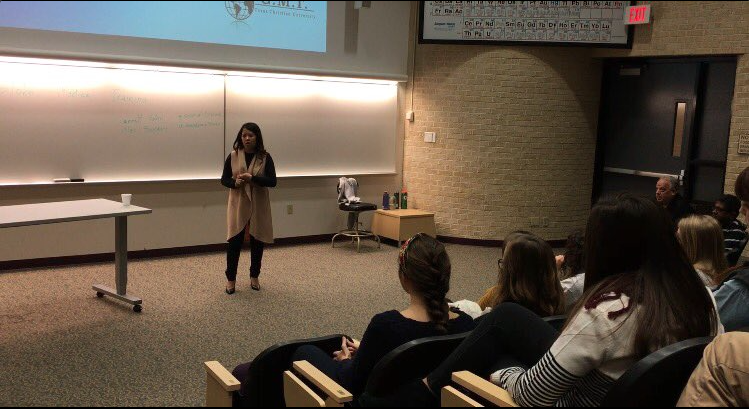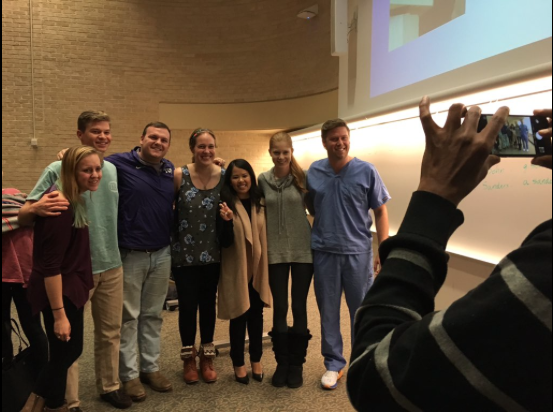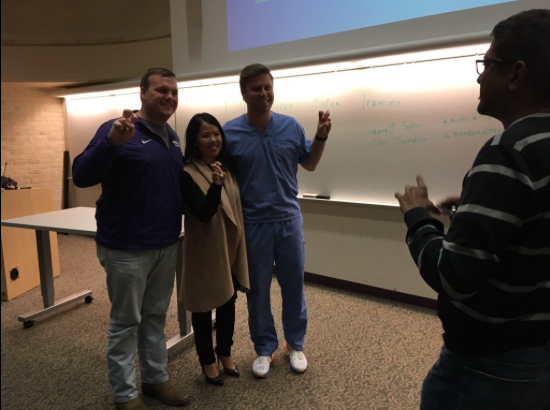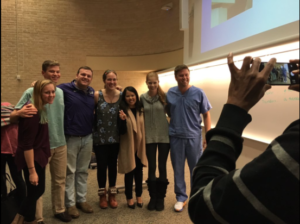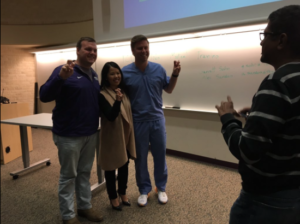TCU alumna and Ebola survivor Nina Pham urged pre-health students Wednesday night to remember to care for their own safety as well as their patients. “Advocate for yourself,” Pham said. “You can have managers and presidents of the hospitals telling you do all of these things, but would they do all of those things themselves? Probably not.” The former intensive care nurse is suing Texas Health Resources, the parent company of Texas Health Presbyterian Hospital, where she worked when she was exposed to the Ebola virus last fall. According to the lawsuit, THR failed to protect her before and after she was diagnosed. According to the suit, “The health care providers were at a high risk for exposure to the deadly virus because they were untrained and were not provided appropriate protective equipment.” A junior nursing major said Pham’s message of being one’s own advocate isn’t something she had thought about before. “The number one thing you’re taught to be is the patient’s advocate,” Christina Sassos, junior nursing major said. “Make sure that their catheters aren’t in for too long, make sure their IVs aren’t in for too long, make sure they’re given their meds on time.”
257453276 Nina Pham Lawsuit File Stamped
According to the Center for Disease Control and Prevention, Ebola is a lethal virus that spread from Guinea, Africa all the way to the United States in December 2013. The virus is highly contagious and spread by direct contact with body fluids. Initial symptoms of the virus include: sudden onset of fever, fatigue, muscle pain, headache and sore throat followed by violent vomiting, diarrhea, rash and impaired kidney and liver function. According to the lawsuit, death occurs in 50 percent of patients. HAZMAT suits were not available the first two days she treated Thomas Eric Duncan, the first person to be diagnosed with Ebola in the United States and her patient at Texas Health Presbyterian Hospital in Dallas, Pham said. “I wore gowns, gloves, surgical masks, and booties,” she said. According to the lawsuit, the ICU did not provide written policies or manuals about treating level four infectious disease patients like those infected with Ebola. Instead, the suit claims most of the information given to Pham came from the Internet. “I was scared because we had Ebola and we were just wearing the same things we would wear for other ICU patients,” Pham said. “Protocols and procedures were nurse-driven. We added more clothing when we saw him getting worse.” Duncan died on Oct. 8. Three days later Pham started getting what she thought were allergy symptoms. By Oct. 17 those symptoms escalated to a 100.6 degree Fahrenheit fever and a positive test for Ebola. “Right when I found out my diagnosis, obviously [Duncan] passing away flashed through my mind,” Pham said. Because of the virus Pham was removed from her job, her family, and Bentley, her Cavalier King Charles spaniel and put into isolation at Texas Presbyterian. Hours later she was transferred to Maryland’s National Institutes of Health hospital, where she would stay until Oct. 24. Nina Pham and her co-worker Amber Vinson, who also contracted Ebola, listened to administrators from Texas Health Presbyterian Hospital and the guidelines set by the Center for Disease Control and Prevention when they treated Duncan. “They acted so confident,” Pham said. “All the doctors were saying any hospital in the U.S. can take care of any Ebola patient. So when everyone that’s more antiquated than I am are telling me this is what we need to do then I didn’t really question it too much.” Pham said that she did not question the CDC at the time but knew the guidelines in place were not adequate for her and Vinson’s situation. “The guidelines ended up changing the time that I was at NIH I believe,” Pham said. She said her mother, Diana, told Dr. Anthony Fauci, director of the National Institute of Allergy and Infectious Diseases, about the protocol leading up to her being transferred to NIH. “He called the CDC, and the next day the guidelines were changed,” Pham said. “I’m not sure if it was him or if it was a coincidence but the next day the guidelines changed.” Pham spent an hour talking and left the last thirty minutes open for students to ask questions. “There were a lot of questions, a lot of people were really intrigued with her story and what she had to say,” said Greg Sohn, co-president TCU’s Global Medical Training chapter. “It’s inspiring to see so many young people be so excited about their futures and wanting to know my story and how it can help them,” Pham said. She said after her experience with Ebola her platform is giving a voice to the frontline caregivers that risk their lives caring for their patients. “I want inspire others to strive for better protocols and ask leadership for better equipment so that they can take care of their patients in the future.” Alex Sanders, co-president of TCU’s Global Medical Training chapter, said the purpose of the event was to allow students to hear Pham’s story and learn from her experience. “I learned it’s important to advocate for myself,” Sanders said. “Those people that are in the hospital, if they’re not willing to do the things that their asking you to do then there needs to be some reevaluation.” Pham said she plans to stay with nursing but isn’t sure if she’d go back to ICU anytime soon; however, she said she wouldn’t hesitate if given the chance to care for another Ebola patient. “I can’t change what happened,” Pham said. “It was definitely a learning experience and I definitely learned the hard way. People risked their lives to take care of me, so I would want to do the same to give back.”


